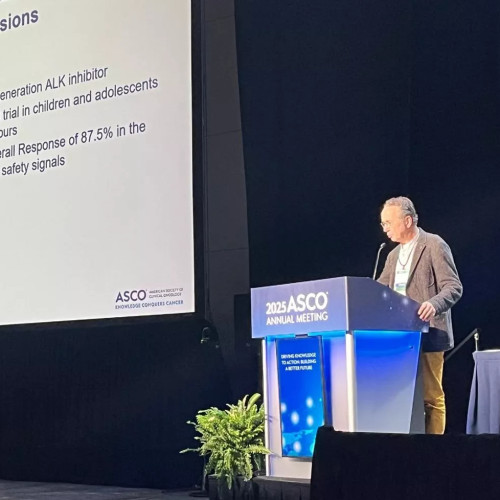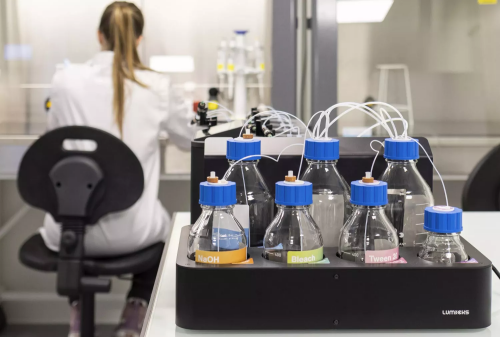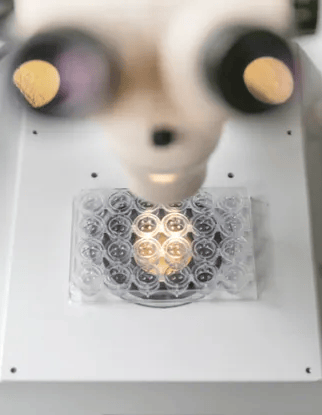|
TO REMEMBER FOR THIS 2024 EDITION Pediatric cancers / Paediatric immunotherapy, new targeted therapy, epigenetic mechanisms: Institut Curie researchers are exploring the biology of tumors to provide better treatment for children. Anti-cancer vaccine / Encouraging results from a novel personalized therapy for ENT cancer patients |
Immunotherapy, new targeted therapy, epigenetic mechanisms: Institut Curie at the forefront of pediatric oncology
Pediatric cancers, the leading cause of death by disease in children, are rare tumors that affect almost 2,500 young patients a year in France. While considerable progress has been made in pediatric oncology in recent decades, 20% of these cancers remain without a satisfactory therapeutic solution. Internationally recognized, teams at Institut Curie's SIREDO center (Soins, Innovation, Recherche en oncologie de l'Enfant, de l'aDOlescent et de l'adulte jeune) are exploring the biology of these pediatric tumors to develop new treatments.
- Pediatric immunotherapy: towards new treatments for Ewing's sarcoma
While the benefits of immunotherapy have been demonstrated in several adult cancers, this strategy is still not very effective in the treatment of pediatric tumors. However, the results presented at the AACR by Dr. Olivier Delattre, director of the SIREDO center and the Cancer, Heterogeneity, Instability and Plasticity unit (U830 - Institut Curie/Inserm), confirm that new prospects are opening for pediatric immunotherapy, particularly for Ewing's sarcoma, the second most common bone tumor in adolescents and young adults.
Nearly 95% of these Ewing's tumors are due to a characteristic genetic fusion - identified in Dr. Olivier Delattre's laboratory - which results in the synthesis of an abnormal protein: the transcription factor EWS-FLI-1. In 2022, Dr. Olivier Delattre and his colleagues demonstrated that this EWS-FLI-1 protein can induce the expression of "neogenes" coding for novel peptides that are absent from healthy cells and strictly specific to cancer cells[1].
Using proteomics, immunopeptidomics[2] and immunology approaches, Institut Curie teams have since studied in detail the nature of these neogenes and peptides likely to be recognized by the immune system. "This work is the fruit of collaboration with the teams of Dr. Olivier Lantz and Dr. Joshua Waterfall at Institut Curie. We have gone a step further by confirming the potential of the identified targets to generate an effective anti-tumor response. The high specificity and recurrent expression of these peptides in a wide variety of childhood sarcomas make them promising targets for the development of immunotherapies for the treatment of pediatric cancers", enthuses Dr. Olivier Delattre.
|
“From oncogenic chimeric transcription factors to immune targets” – Dr Olivier Delattre Major Symposium SY27 le 8 avril 2024 « Targeting Aberrant Transcription in Pediatric Cancer » |
- Genomics to better understand the origins of medulloblastoma
Medulloblastoma is the most common brain cancer in children. It develops in the cerebellum and constitutes a highly heterogeneous group of tumors. However, this tumor develops from a cell type that is present only during fetal development of the human brain. This discovery, published in Nature[3] in 2022 by Dr. Olivier Saulnier and his colleagues, opens hitherto unexplored avenues of research to better understand the mechanisms behind these cancers, and in particular the mapping of this cell type during human embryonic development. Today, at Institut Curie, the Genomics and Development of Childhood Cancers team led by Dr. Olivier Saulnier (U830, Institut Curie/Inserm) is particularly interested in this theme. "We've all played the game of dropping a marble onto an inclined board with nails attached, so that it hits the target square at the bottom. This perfectly illustrates the multitude of possible trajectories a cell takes during development. In the case of childhood cancers, the original cell stops in the middle of the tray and doesn't continue its journey, causing abnormal differentiation at the root of many pediatric cancers. Our aim in the laboratory is to use single-cell omics technologies to identify where, when and why this cell stopped. This is the focus of the work presented at the AACR, in particular the mapping of this cell at the origin of medulloblastoma tumors", explains Dr. Olivier Saulnier, winner of the AACR's NextGen Stars 2024 program.
|
Dr. Olivier Saulnier has been selected by the AACR as part of its NextGen Stars 2024 program, which offers the opportunity for 10 young award-winning researchers to present their work at the AACR Annual Meeting and support their professional development and advancement. "Tracing the developmental origins of group 3 medulloblastoma" - Dr. Olivier Saulnier - Major Symposium SY27 on April 8, 2024 "Targeting Aberrant Transcription in Pediatric Cancer" |
- A new targeted therapy in very rare pediatric cancers
In children and adolescents, malignant tumors with fusions involving the ALK gene - such as certain high-grade childhood gliomas and sarcomas - continue to have a poor prognosis. Inflammatory myofibroblastic tumors (non-malignant but locally invasive) also often display this type of fusion. While alectinib, an ALK inhibitor, has been shown to be effective in adult cancers (particularly non-small cell lung cancers with ALK fusion), this drug has never been evaluated in these pediatric tumors (apart from certain lymphomas).
Prof. François Doz, Deputy Director of Clinical Research, Innovation and Teaching at Institut Curie's SIREDO center, is the first author of the first presentation to the AACR of the results of a study using alectinib in children and adolescents with ALK-fused central nervous system tumors or non-lymphomatous solid tumors. "Alectinib was well tolerated in young patients with these very rare ALK-fused tumours. No toxicity was reported. Above all, the efficacy results, although still very preliminary, are promising, with most patients achieving a response, demonstrating a favorable benefit-risk profile", explains Prof. François Doz.
Chez les enfants et les adolescents, les tumeurs malignes présentant des fusions qui impliquent le gène ALK – telles que certains gliomes infantiles de haut grade et certains sarcomes – demeurent des cancers de mauvais pronostic. De plus, les tumeurs myofibroblastiques inflammatoires (non malignes mais localement envahissantes) présentent également souvent ce type de fusion. Si l’alectinib, un inhibiteur de ALK, a démontré son efficacité dans des cancers de l’adulte (en particulier des cancers du poumon non à petites cellules avec fusion de ALK), ce médicament n’a jusqu’à présent jamais été évalué dans ces tumeurs pédiatriques (en dehors de certains lymphomes).
|
“Alectinib in children and adolescents with solid or CNS tumors harboring ALK-fusions: Data from the iMATRIX Alectinib Phase I/II open-label, multi-center study Clinical Trials” – Prof François Doz - Minisymposium April 9 2024 ‘Novel Agents and Emerging Therapeutic Strategies” |
- Epigenetics to better understand and target the onset of neuroblastoma
Neuroblastoma is a pediatric cancer that develops from the sympathetic nervous system, mainly in the abdomen, sometimes along the spine or in the adrenal glands. This solid extra-cerebral malignant tumor is the most common in young children, and its prognosis is poor.
The team led by Dr. Gudrun Schleiermacher, Deputy Director of Translational Research at the SIREDO center, in collaboration with Dr. Isabelle Janoueix-Lerosey, researcher at the CHIP Unit (Institut Curie/Inserm), is interested in epigenetic mechanisms (capable of activating or deactivating the expression of certain genes) in the development and progression of neuroblastoma. The work presented at the AACR shows that scientists have identified for the first time some of these processes, which lead to the deactivation of certain genes and result in the development of cancer. By providing new insights into the development and clinical sub-classifications of the disease, these results point to potential new therapeutic targets, which may in the longer term improve the prognosis of young patients.
|
Study of spatial and temporal epigenetic heterogeneity in neuroblastoma suggests role of H3K27me3-mediated repression Charlotte Butterworth (…) Güdrun Schleiermacher - Poster session April 8 2024 “Pediatric Cancer Genomics and Epigenomics” |
Anti-cancer vaccine: encouraging results from a novel personalized therapy to prevent relapse in ENT cancer patients
Immunotherapy has a limited impact on ENT cancer patients, for whom the risk of relapse is unfortunately high. However, a new strategy is under study, and initial clinical results are encouraging: personalized vaccines.
Using artificial intelligence and machine learning tools, the researchers were able to design each vaccine individually, based on the sequencing of each patient's tumors. The results of a Phase 1 clinical trial involving 33 patients will be presented at the AACR by Dr. Olivier Lantz, Deputy Director of the Immunity and Cancer Unit (Institut Curie / Inserm). "Our results show that the personalized vaccine induced specific immune responses and led to low relapse rates," he says. Patient follow-up, in addition to in-depth immunological data, supports the study's positive results. "Our work demonstrates the potential of therapeutic vaccines, which could not only prevent relapse in ENT cancers but also make the tumor more receptive to other forms of immunotherapy. We look forward to continuing the study of this vaccine," concludes Prof. Christophe Le Tourneau, Head of Institut Curie's Early Clinical Trials Department and international co-coordinator of this clinical trial.
|
Personalized vaccine TG4050 induces polyepitopic immune responses against private neoantigens in resected HPV negative head and neck cancers - Session 10 avril 2024 “Late-Breaking Research: Clinical Research 3” |
|
Also on the agenda of the 2024 AACR:
>Epimedications and circulating biomarkers / Circulating HPV DNA identified for the first time as a potential biomarker to monitor response to an epimedication and immunotherapy in squamous cell carcinoma. > Circulating HPV DNA as a potential biomarker to monitor response to the Pembrolizumab and Vorinostat combination in patients with squamous cell carcinoma of different locations – Dr. Emmanuelle Jeanot (…) Prof. Christophe Le Tourneau - Poster session April 8 “Circulating Nucleic Acid2” > Biomarkers of response and progression to Pembrolizumab and Vorinostat combination in late-stage squamous cell carcinoma patients of different locations included in the PEVOsq basket trial – Prof. Christophe Le Tourneau (…) Dr. Maud Kamal - Poster session April 9 “Predictive Biomarkers 5” > Cancer of unknown origin / Major impact of the national multidisciplinary consultation meeting, coordinated by Institut Curie, in guiding the management of more than two-thirds of patients. Poster session April 9 “Molecular Classification of Tumors for Diagnostics, Prognostics, and Therapeutic Outcomes”: > National Multidisciplinary Tumor Board improves diagnostic stratification and therapeutic management in Cancers of Unknown Primary – Dr. Célia Dupain (…) Dr. Sarah Watson > Metastatic renal cell carcinoma with occult primary: Clinical and biological evidence for a new entity of cancers of unknown primary that beneficiates from tissue-tailored treatment – Dr. Nicolas Jacquin (…) Dr. Sarah Watson
> Cervical cancer / Presentation of the results of the European Raids project on the genomic landscape and drug response characteristics for personalized therapeutic approaches in cervical cancer. > Integrative genomic and transcriptomic profiles from a prospective cervical cancer study (RAIDs) – Dr. Maud Kamal (…) Dr. Ivan Bièche - Poster session April 8 “Genomic Characterization of Cancers and Cancer Subgroups” > Genetic alterations and pharmacological response profiles from 10 cervical cancer cell lines – Dr. Suzy Scholl (…) Dr. Elaine del Nery Santos - Poster session April 9 “Genomic Changes and Intratumoral Heterogeneity as Predictive Biomarkers for Clinical Outcome” > Genomic alterations predictive of outcome in early staged cervical cancer: a translational investigation from the SENTICOL III trial – Dr. Ivan Bièche - Poster session April 9 “Molecular Biology in Clinical Oncology: Genetics and Beyond” |
[1] Oncogenic chimeric transcription factors drive tumor-specific transcription, processing, and translation of silent genomic regions. Molecular Cell (2022), https://doi.org/10.1016/j.molcel.2022.04.019
[2] Immunopeptidomics is an emerging field of science - notably in the development of vaccines or cancer immunotherapies - that studies peptides involved in the T cell-mediated immune response.
[3] Hendrikse, L.D., Haldipur, P., Saulnier, O. et al. Failure of human rhombic lip differentiation underlies medulloblastoma formation. Nature 609, 1021–1028 (2022). https://doi.org/10.1038/s41586-022-05215-w



